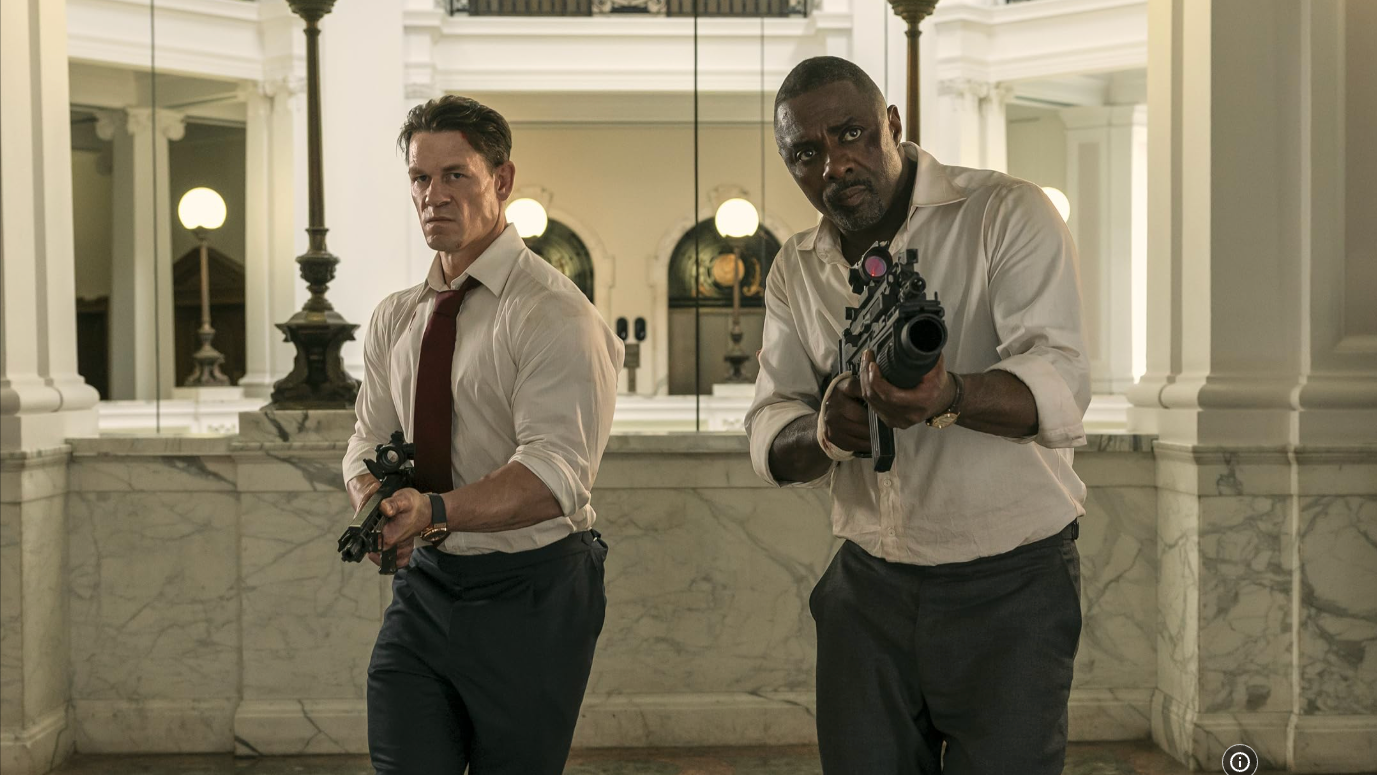‘Adolescence’ REVIEW: It’s more than just the damn phone
‘Adolescence’ REVIEW: It’s more than just the damn phone
Eddie Miller (Stephen Graham) and his son, Jamie (Owen Cooper), in Adolescence | Still courtesy of Netflix
This review contains spoilers for Adolescence.
A film about a 13-year-old boy accused of committing a crime may go something like this: “Boy is accused of a crime. Boy goes through a grave process of investigation before the trial. Boy lets out his emotions and promises that he did not do it. The family is devastated.”
Adolescence, a TV series directed by Philip Barantini, can be summarized with these four sentences. From its first very impactful episode up to the last emotional and tear-jerking minutes of the series, we see how the build-up of the emotions, characterization, and even the setting have evolved to make it such a short, yet meaningful story.
The series has caught the attention of many audiences not just because of the story, but also because of the one-take shots of the four episodes. This cinematographic aspect of the four-part limited series makes the story even more captivating to watch, as the tension between the characters, the setting, and the environment continues to flourish throughout the story and the unfolding of events. Even more so, Owen Cooper, a 15-year-old actor who just entered into the industry, plays his character, Jamie Miller, so well. With the remarkable emotions he lets out in accordance with the people he interacts with, Adolescence reveals a more intriguing and mind-boggling theme per episode.
Fairly speaking, I am not here to talk about the technicalities of the film — given that it is already one of the most astonishing factors of what makes the series worthy of your time. Surely, it makes the nature of social media and technology more complex. The sharing of information, posting of selfies, and peer interactions all lead to the two main themes of the series: incel culture and misogyny.
DS Luke Bascombe (Ashley Walters) and his partner, DS Misha Frank (Faye Marsay) in Adolescence | Still courtesy of Netflix
THE SIMPLEST FORMS OF MISOGYNY
From the first episode, the chaos of the family’s emotions and Jamie’s distress from his arrest early in the morning becomes the background and context for the audience. We know that Jamie did it, and the main point of each episode is to understand why. The pieces of evidence are clear, and the grudge that each character holds becomes stronger and more intense.
From Jamie’s arrest, we already see him wanting his father by his side, calling out his name and asking for his presence until they arrive. Jamie chose his father, Eddie, played by Stephen Graham, as his appropriate adult–the person who would support or guide a minor in special situations such as custody interviews. It is clear that his mother and sister, Manda (Christine Tremarco) and Lisa (Amelie Pease), really care for him as well.
Manda knows Jamie’s fear of needles — the little things that a mother remembers about their child–but no clear reactions from Eddie when mentioned to the family. Clearly, because Eddie is a male man, Jamie expects him to understand his side, and even more so, let his father believe that he, indeed, did not do anything wrong.
The simplest forms of misogyny are rooted within the everyday decisions that an individual may not even notice. The teacher within the school grounds of Jamie’s school forgets to introduce the female partner (DS Misha Frank played by Faye Marsay) of the officer-in-charge (DS Luke Bascombe played by Ashley Walters) of Jamie’s case; Jamie says only the most limited positive things about her mother during his interview with the psychologist in charge of Jamie’s case (Briony, played by Erin Doherty); and the symbolism of the sandwich offered by Briony, usually perpetuating a psychological test to accept (the feeling of being powerless) or reject it (the assertion of control).
Clearly, Jamie’s treatment of Briony is the most accurate and direct form of misogyny that Adolescence portrays. Throughout their conversation, Jamie instills fear in Briony by shouting, standing up, and throwing things across the room to intimidate her. Cooper and Doherty play their characters really well, and the camera angles also play a huge role in showing the hierarchy present within the scene as Jamie looks down on Briony, assuming that he knows better and can scare a woman off. It is intriguing to watch a series so accurate of such conditions, because as viewers, we are appealed by the fact that it is very close to our reality.
Forensic psychologist Briony Ariston (Erin Doherty) and Jamie Miller (Owen Cooper) in Adolescence | Still courtesy of Netflix
THE INCEL CULTURE AMONG YOUNG BOYS ON THE INTERNET
Here’s the thing: “I did not do it” and “I did not do anything wrong” are two completely different statements. And throughout the series, one of the most frequent dialogues we hear from Jamie is the latter. He stands on his belief that what he did is justifiable indirectly, and the events per episode help us understand why. Some netizens believe that Jamie is simply a victim of bullying. He experiences these hateful comments and humiliation on social media, faces rejection, and acts on his belief to stab a young girl to death.
We learn a lot about Jamie’s insights when he talks to Briony — his rage, his thoughts on Katie’s leaked pictures, the nature of sending messages on social media, and his overall revealed self. The third episode captures the intensity of what young boys are exposed to on the internet today. Just because someone told them or sent them something convincing of what they think about themselves, they believe it and act on this very risky belief. Precisely, “alpha male influencers” have captured this core distinct concept of what it means to be a man, and from what we are seeing, these behaviors and thinking are based on the grounds of anti-feminism and misogyny.
Another scene I want to bring up, especially in relation to the incel culture, is how other young boys — or worse, men — support this type of subculture on the internet. This discussion is not entirely about the struggles of young boys, but mostly about how the ideologies and unethical practices of this subculture have spread on different social media platforms, to the point where harassment and assault towards young girls and women have become normalized just for them to prove their point. The harm that the incel ideology is causing does not only affect women, but also men, as it reinforces unhealthy standards and expectations about masculinity, femininity, and social, romantic, or sexual relationships.
The concept of incel can be seen as a subculture deeply rooted in misogyny. However, it is also crucial to understand that because of the rejection they face and the socially constructed standards that are almost impossible to reach, they may experience more complicated problems beyond anxiety and depression. Hence, the struggles of men and women are always intersecting with one another — as seen in the series — showcasing the different levels of struggles and experiences that make them believe in the limitless possibilities of justification. Jamie greatly embodies this ideology, and he does even more so through the emotionless but rageful tone in his tones and dialogues.
Adam Bascombe (Amari Bacchus) and his father, DS Luke Bascombe (Ashley Walters) in Adolescence | Still courtesy of Netflix
CONCLUSION
Adolescence is not just about the struggles of women or men alone. Stephen Graham, in an interview with Jimmy Fallon, shares his insights about the respectable weight that each one of us has in shaping young minds from our own families to the larger educational institutions.
Some argue that Adolescence perfectly portrays the harmful nature of social media. We see how the influence of normalized misogyny and incel culture has gone through the deepest and most shallow levels of various platforms. I argue that this is exactly what the show wants us to think, but each of us plays the largest involvement in letting people, especially children, understand that things are more complicated than they are — it’s more than just the damn phone.
We can all agree that children are exposed to the dirtiest nature of social media at a very young age. This nature stems from the most problematic and controversial ideologies emerging from different so-called influencers that continue to pollute their innocent minds. Adolescence is not a one-lens view towards the problems that men and women continue to face. In fact, it serves as a show to recognize the struggles of both. Indeed, the hype for Barantini’s new series is worth it. It goes beyond the discussions of knowing the unknown, fearing the self, and controlling others through dialogue and ideology.
‘Adolescence’ is currently streaming on Netflix.









![‘SEVENTEEN World Tour [Be the Sun]’ REVIEW: Time’s role in building identity and community in music](https://images.squarespace-cdn.com/content/v1/603206e1372b9903d47694fa/c5520cb3-a3ac-4ebc-9365-c561c47e883b/Charlie+Vitug_REVIEW_SEVENTEEN_PICTURE+1.jpg)


